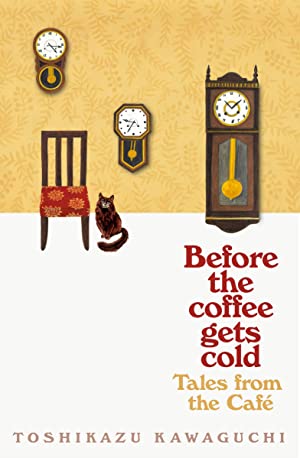The Best Friend
Gohtaro Chiba had been lying to his daughter for twenty-two years.
The novelist Fyodor Dostoyevsky once wrote, ‘The most difficult thing in life is to live and not lie.’
People lie for different reasons. Some lies are told in order to present yourself in a more interesting or more favourable light; others are told to deceive people. Lies can hurt, but they can also save your skin. Regardless of why they are told, however, lies most often lead to regret.
Gohtaro’s predicament was of that kind. The lie he had told plagued him. Muttering things to himself, such as ‘I never wanted to lie about it,’ he was walking back and forth outside the cafe that offered its customers the chance to travel back in time.
The cafe was a few minutes’ walk from Jimbocho Station in central Tokyo. Located on a narrow back street in an area of mostly office buildings, it displayed a small sign bearing its name, ‘Funiculi Funicula’. The cafe was at basement level, so without this sign, people would walk by without noticing it.
Descending the stairs, Gohtaro arrived at a door decorated with engravings. Still muttering to himself, he shook his head, swung round and began walking back up the stairs. But then he suddenly stopped with a thoughtful expression on his face. He went back and forth for a while, climbing the stairs and descending them.
‘Why not stew over it after you come in?’ said a voice abruptly.
Turning around, startled, Gohtaro saw a petite woman standing there. Over her white shirt she was wearing a black waistcoat and a sommelier’s apron. He could tell instantly she was the cafe’s waitress.
‘Ah yes, well . . .’
As Gohtaro began to struggle with his response, the woman slipped past him and briskly descended the stairs.
CLANG-DONG
The ring of a cowbell hung in the air as she entered the cafe. She hadn’t exactly twisted his arm, but Gohtaro descended once again. He felt a weird calmness sweep over him, as if the contents of his heart had been laid bare.
He had been stuck walking back and forth because he had no way of being certain that this cafe was actually the cafe ‘where you could return to the past’. He’d come there believing the story, but if the rumour his old friend had told him was completely made up, he would soon be one very embarrassed customer.
If travelling back to the past was indeed real, he had heard there were some annoying conditions that you had to follow. One was that there was nothing you could do while in the past that would change the present, no matter how hard you tried.
When Gohtaro first heard that, he wondered, If you can’t change anything, why would anyone want to go back?
Yet he was now standing at the front door of the cafe thinking, Even so, I want to go back.
Had the woman read his mind just now? Surely a more conventional thing to say in that situation would be, Would you like to come in? Please feel welcome.
But she had said, Why not stew over it after you come in?
Perhaps she meant: yes, you can return to the past, but why not come inside first before deciding whether to go or not.
The bigger mystery was how the woman could possibly know why he had come. Yet he felt a flicker of hope. The woman’s offhand comment was the trigger for him to make up his mind. He reached out, turned the doorknob, and opened the door.
CLANG-DONG
He stepped into the cafe where, supposedly, you could travel back in time.
